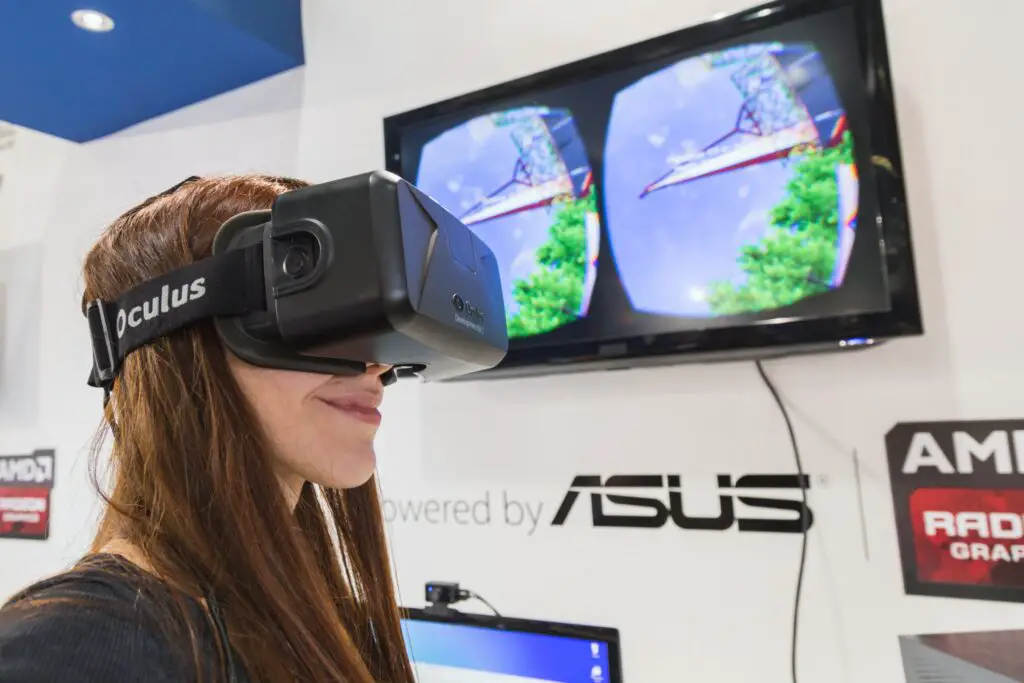
Oculus headsets were a game changer when it came to augmented reality. Investors that believe in the metaverse and want to get a piece of the market wonder how they can invest in Oculus.
Oculus is not publicly traded on the stock market. However, people can purchase stock in Oculus by purchasing shares in Facebook, as Facebook currently owns Oculus. Some people think Oculus is publicly traded because Oculus VisionTech is publicly traded, but they are different companies.
With Facebook taking a huge step forward changing their name outright to Meta, many wonder how they can profit off game changing VR tech. To find out more information about Oculus and its competitors, keep reading.
Was Oculus Ever Publicly Traded?
Oculus was never publicly traded in the stock market, partially because it was only in business for slightly less than 2 years (601 days) before being purchased by Facebook. Because, Oculus was an independent business for such a short time and the owners didn’t IPO the stock, it was simply never publicly traded.
The way that Oculus received its funding also contributed to the reasons why it has never been publicly traded.
How Oculus Became a Company
Oculus was originally funded on Kickstarter in August of 2012 by people that really wanted to get their hands on a quality VR headset, as the VR headsets that had been made up until that point were mediocre and made people dizzy.
Within a few days, the company raised about $2.5 million, even though they only had a goal of $250,000.
Because of how successful the Kickstarter was and how passionate the original creator was about VR headsets in general, the owners decided to continue making and developing these VR headsets.
Palmer Lucky an Obsessed Founder
Palmer Luckey loved VR headsets and found them fascinating. Whenever a new VR headset was released, he would purchase it.
Luckey was frustrated to discover many VR headsets he purchased didn’t actually work. He would take some of them apart and use the parts to create his own VR headset that worked better. This began when he was just16 years old.
While he was putting together these headsets, he would chat with others that shared a similar passion on various forums, and sometimes mentioned the VR headsets.
While on these forums, the VR headsets that Luckey was talking about caught the attention of John Carmack. He is the lead programmer behind Wolfenstein 3D, Quake, and Doom, and was the co-founder of id Software.
A New Business Partner
The VR headsets that Luckey was making caught Carmack’s attention partially because Carmack was looking into making his own VR headsets and he wanted to see how other ones worked.
When Carmack asked Luckey if he would sell a VR headset to him, Luckey sent him one for free, knowing Carmack’s prestigious past.
After Carmack tested out the VR headset that he received, he began talking about it at conventions and with his friends that were also in the tech industry.
This created a lot of interest in Luckey’s VR headsets, so with the help of a few others, Luckey dropped out of college and started the company with the help of Kickstarter, naming it OculusVR, more commonly known as Oculus.
How has Oculus Technology Integrated With Facebook?
Oculus was purchased by Facebook in 2014, and as a result become integrated into Facebook’s platforms and systems. Oculus devices will stop being supported at the beginning of 2023.
Now, Oculus is part of a division within Meta Platforms, owned by Facebook and is simply called Meta. The platform that it’s part of is called Reality Labs, as it’s the part of Facebook that makes VR headsets and software.
Facebook is extremely focused on creating an independent and compact version of the Oculus headset in order to reach a larger market. While I believe the quality will take a hit Facebook is investing in a distant future.
Nowadays, anyone that uses Oculus VR headsets, new and old, uses their Facebook account to sign into the games they play and the overall system. Without a Facebook account, people can’t use their Oculus headsets, which is frustrating for many.
The Major Rivals to Oculus
Although Oculus was and still is a unique device, as part of the tech industry it has a lot of competition. Here are some of the companies that are compete with Oculus
Sony
Sony is one of Oculus’ main competitors. Stock in Sony is publicly traded on NYSE. If you want to invest in Oculus’ competition, you can do so by investing in Sony.
Sony makes VR headsets compatible with the Playstation 5, as Sony manufactures Playstation gaming consoles. Many people are interested in purchasing Sony’s VR headsets so they can delve into the world of gaming in a way that they haven’t been able to in the past.
HTC Vive
Vive is extremely similar to how Oculus used to be. They makes quite a few VR headsets that many people love. Vive is not currently publicly traded, but you can support them through their website.
HTC Vive can be used via steam and works closely with valve corporation on development.
Microsoft
Microsoft manufactures multiple VR headsets. Although the company is known for making computers and various software programs, they have delved into the world of VR. However, they seem to be lagging behind their competitors in various ways, as many people have complaints about their VR headsets. Microsoft is also publicly traded on the stock market.
Apple
Although Apple technically is one of Oculus’ competitors because of how big of a tech company it is, they aren’t keeping up with them at all in the VR headset department. Apple was supposed to release its first VR headsets in May of 2022, but they have since been delayed.
Oculus and the Future of the Metaverse
Overall, Oculus is an interesting company that had a relatively short independent life. Luckily, it kickstarted a massive amount of interest in VR headsets and kickstarted the metaverse gold rush.
You can still technically purchase Oculus products on their website, but they are supported by Meta. This may be a good thing, as Meta is going all in developing its own virtual reality platform.
Hopefully the metaverse doesn’t end up a winner takes all world, but rather one that allows you to jump between platforms.
